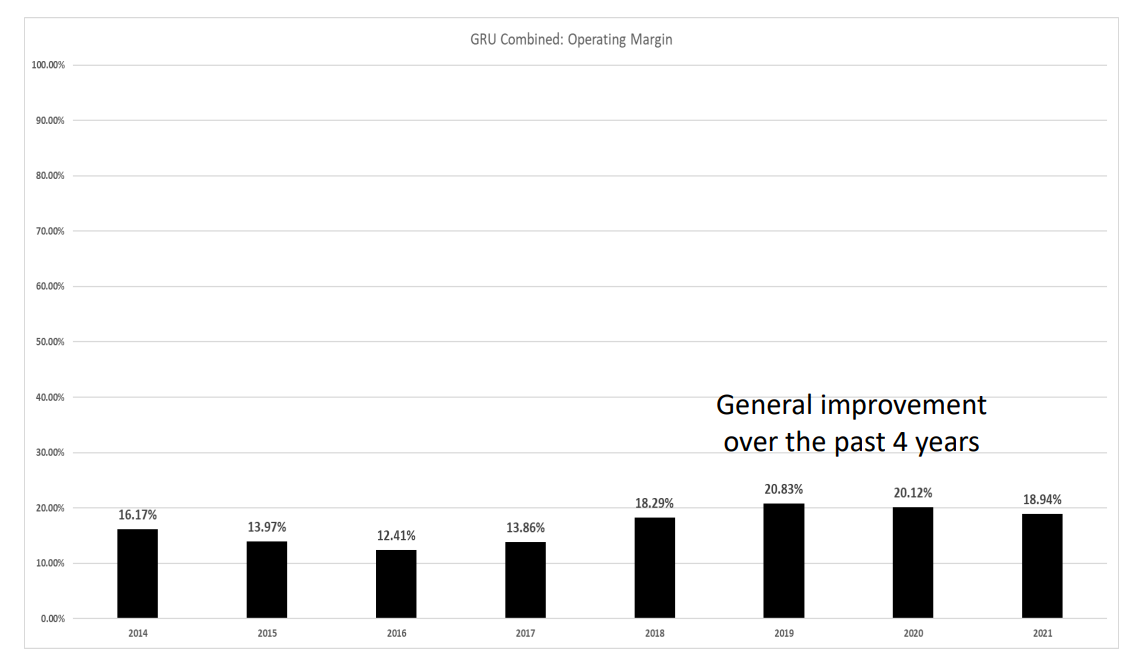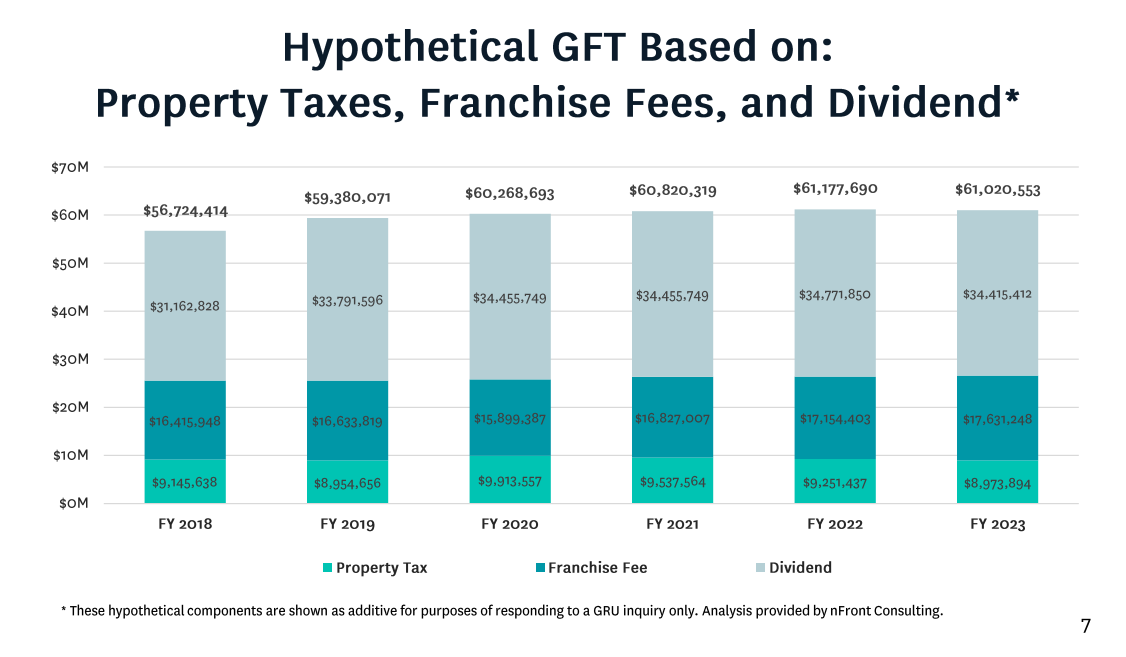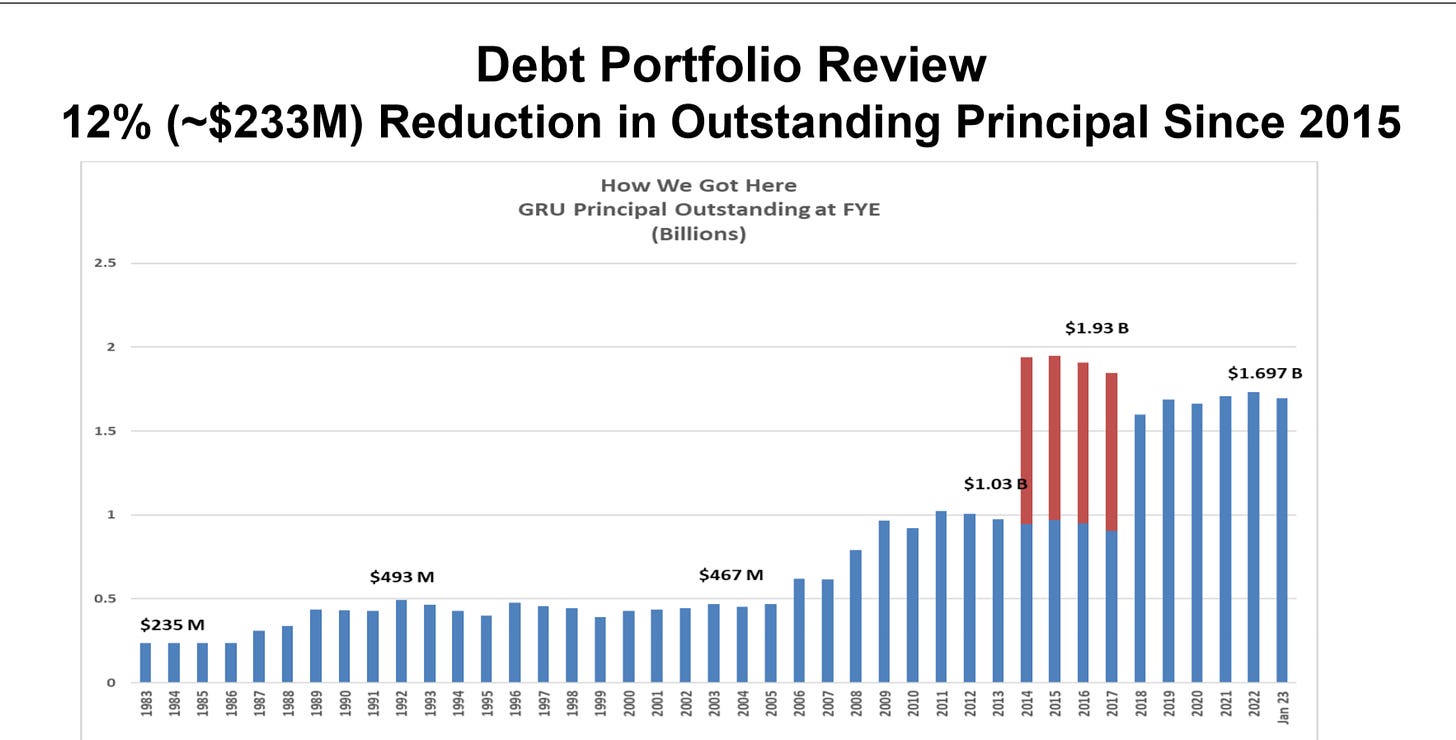Correcting the Misinformation on GRU
The lies, misdirection, and falsehoods of this state takeover need to be called out. I'm doing that and, unlike Clemons, citing all my sources.
On Thursday the Florida House passed, on party line vote, an unprecedented takeover of a local government. Nothing like HB 1645 has happened in Florida history, and I can’t find any municipal utility structure like this anywhere else in the United States of America.
The hardest thing to stomach is watching GRU get taken from the local residents through a never-ending stream of pure falsehood and mischaracterizations. Not that any of that is new with Tallahassee politicians and GRU. Let’s remember that Keith Perry ran ads in 2018 claiming Harvey Ward joined Keith Perry in supporting an independent GRU board, that the commission was raising rates to pay for an ice skating rink, and sent out mailers quoting Ed Bielarski with things Ed never said. When GRU is on the table, reality doesn’t really matter.

That was all outrageous, but at least we could correct the record over the course of a campaign. This time we have no way to do that. The bill was filed in week seven of the nine-week session, giving the public no time for review and debate. When our mayor went up to speak at the only Committee it would be sent to, he was given 30 seconds. The bill was noticed over a month after the local bill filing deadline per House rules, but apparently the House can ignore their own rules whenever they please.
So I want to correct the record on just some of the vast misinformation, lies, and nonsense that has come out of this. Not because I think it will change anything, but at some point the facts have to be out there.
And unlike Clemons, I’m going to cite every single source, because big claims deserve that.
“GRU is on the path to bankruptcy”
This has been a talking point since day one, and there’s no evidence for it at all. It’s already been fact checked by the Gainesville Sun, saying, “Clemons has said publicly that the city is on the brink of bankruptcy, though there is no indication that it is.”
Not one single utility expert has claimed that GRU is headed toward bankruptcy, it’s all Tallahassee politicians, who are not experts and know nothing about utility finances.
Of course, I’m no utility financing expert either, so let’s look at the actual experts for utility finances: the bond ratings agencies that review utility debt. These are Fitch, Moody’s, and S&P. They analyze GRU debt on a regular basis, conducting in depth reviews of our financial stability, and answer to outside bond holders to ensure we are a stable and good investment for their money. They don’t work for us, they’re neutral, and are ideal experts to show the actual financial sustainability of GRU.
So what do they think of GRU? They think GRU is doing fine! Moody’s rates GRU AA3, which is higher than most other municipal utilities in Florida. Fitch has us at A+. These ratings are higher than Florida Power & Light and Duke Energy. Here’s what Fitch has to say about our bond rating:
The 'A+' bond ratings and 'a+' SCP reflect the combined utility system's very strong revenue defensibility, supported by its independent rate raising authority and stable demographic trends, as well as its strong operating risk profile, which includes a low operating cost burden through ownership of a diverse, mainly owned resource base. The customer base is diverse and growing, and rates are generally affordable.
GRU's leverage is high for the rating. Fitch expects a trend of improvement in leverage as a result of approved base rate increases, lower general fund transfers, the recovery of actual fuel costs, and an expected rise in financial margins. The utility's leverage ratio, calculated as net adjusted debt to adjusted funds available for debt service (FADS), increased slightly in 2021 to 10.3x. Fitch anticipated the increase in leverage following GRU's issuance of 2021 bonds during the last rating review, and Fitch's base case scenario analysis indicates leverage should decline steadily in subsequent years to around 9.0x by 2025. The current ratings and Stable Outlook remain tied to expectations of lower future leverage, below 10.0x in the near term, which hinges on GRU's ability to carry out its financial plan.
As you can see, they recognize GRU’s high debt load, but they believe it’s manageable. There’s no question, GRU is a highly leveraged utility. But leverage is not the main metric they look at. Overall “Debt & Liabilities” is only 20% of S&P’s weighting for analyzing utility debt ratings. It’s important, but a secondary consideration. What they look at is overall risk, cash flow to pay back bonds, and overall liquidity. We are in the “extremely strong” category for all of those metrics.
“The City has taken $68/$100 million more than GRU has earned in profit”
This is an important one, as Chuck Clemons has claimed from the floor this is why the state has a “compelling interest” to do this unprecedented takeover of our municipal utility.
And just to be clear, it would be really bad if the city took more from the utility in funds transfers than it made in annual operating profit. That would break our bond covenants, tank our bond ratings, and would likely break a number of regulations. If it were true, maybe we should have the utility taken from us.
Thankfully it isn’t. We don’t take more from the utility than it earns and that is easily proven. Our audited financial statements are all publicly available, you can go through and see our net revenues as per our bond resolution. Nothing in any of these adds up to anywhere near $68 million over 4 years or $100 million over 10 years.
In fact, it’s all positive! We have made more than enough to pay our debt service payments, pay the general funds transfer, and sock some money away for future capital projects.

Chuck Clemons own bill uses the calculations we’re using here, so even under his own calculations we are not taking more from the utility in transfers than we’re making in profit:
7.11 Limitation on Government Services Contribution. —
(1) Maximum Cap on GSC. For any fiscal year, the GSC may not exceed aggregate utility system net revenues less flow of funds.
(6) "Flow of Funds" means the sum of required debt service, necessary operations and management expenses, a reasonable contribution to a utility plan improvement fund, identified SLA related losses, and any other lawful purpose as provided in bond covenants.
Go through the audited financial statements for 2022, 2021, 2020, and 2019 and you’ll see “Total net revenues in conjunction with the bond resolution” are always in the black, even taking away debt service payments and the General Funds Transfer
I have no idea where Rep. Clemons gets his numbers from, as they’ve never cited any public documents and it’s not in the JLAC report. It’s possible they’re using some Frankenstein accounting structure that adds in depreciation and other expenses that aren’t a part of how our bond resolution accounts for “net revenue”. In a utility the size of GRU, with the complexities of all the assets and finances and bonds and numbers, there are a million ways to cherry pick and get to a number you want.
But I’m following Rep. Clemons own formula, and by that we have made more than we’ve spent and are very much in the black.
“The City has used GRU ‘like a piggy bank’”
Reasonable people can disagree on what a “piggy bank” is, but we take less from GRU than almost any other energy generating municipal utility in Florida and have reduced the transfer every year.
To give some background, what people are referring to here is the “General Funds Transfer” from the utility to the general government of the city, which is $33.5 million for us in 2023.
This has been a political bludgeon for as long as I can remember, going back to 2018 when the Republican Party was running ads calling it a “slush fund” being used to “build an ice skating rink.” The ice skating rink, of course, didn’t exist and was entirely made up. (Which is unfortunate, an ice skating rink would be pretty cool to have especially in the hot Florida summer).
The truth is that the General Funds Transfer is a revenue stream every utility uses, and the City of Gainesville’s is low compared to other utilities. Our transfer is 9.6% of revenue from the utility, making it significantly lower than Tallahassee (16.8%), Orlando (14.07%), Lakeland (13.25%) and others.
Today the transfer is $33.5 million, which is the lowest it’s been since at least 2011. If that kept pace with inflation the general funds transfer would be $47 million. Next year, with our incredibly large plan to reduce debt, we’ll be even lower to $15 million, or 3.9% of revenue. I can’t find any generating utility in the US with that low of a GFT.
But I don’t want you to misunderstand me, the GFT is not a “piggy bank” for these other municipal utilities either. There would be a payment from any private utility to the City in the form of property taxes and franchise fees, with the additional “dividend” for the owners of the utility just as if it were privately owned.
Property taxes are pretty well known: it’s the tax we levy on all property. Franchise fees are payment private utilities pay the cities they operate in for use of the city right of way. Think of this as a land rental: private utilities couldn’t function without cities letting them use their taxpayer funded right-of-way along the roads, which were paid for by tax dollars. They’re just paying rental fees for the use of this property, just like any other company would.
And those would be high. In 2020 a consulting firm was brought in to recommend a reasonable General Funds Transfer that would balance the needs of the utility and general government. Their conclusion was $36 million was a reasonable GFT that balanced General Governments need for stable funding with GRU’s ability to pay. They also found that GRU would be paying about $26 million in franchise fees and taxes if it were privatized.

So no, we’re not using the utility like a piggy bank, we are one of the most fiscally responsible municipal utilities in Florida, thank you very much.
“The City Commission has done nothing to reduce GRU debt”
The City Commission has reduced GRU debt by $233 million since 2015.
But that only tells a part of the story. The City Commission in recent years has voted on a debt defeasance policy, upped our liquidity, and have taken steps that reduce the overall transfer payments from GRU.
Our general funds transfer (as discussed above) is lower today than it was a decade ago. in 2013 the GFT was $36 million, today it is $33.5 million.
All that’s good, but what comes next is even bolder. The city has now approved a plan to reduce debt by $315 million over the next 10 years, resulting in the largest cuts to our city government ever, three times the cuts we made during the recession. These are big, bold moves that deserve to at least be recognized.
“GRU rates have risen 25% since 2018”
After a month of claiming that this takeover bill was due to high GRU debt, Clemons quickly ended his speech on the house floor moving the goalposts after being inundated with facts about GRU’s high bond ratings and our aggressive plans to reduce debt. He ended by claiming that this bill isn’t about debt or bond ratings, but about GRU rates, before launching into complaints about the referendum he sponsored before that was rejected by 60% of our residents, “Guess what’s happened since 2018? Gainesville Regional Utilities have raised their rates on everyone, from the renter to the commercial, by 25%.”
Electric rates are public information, so this is easily disproven. GRU base rates in November 2018, when the election took place were $87.87, today they are $102.63, a 16.7% increase.
Putting that into context, inflation since November 2018 was 20%, so in inflation adjusted terms the electric rate you are paying is lower today than it was in November 2018.
I don’t want to cherry pick data like Clemons is doing, so it’s worth mentioning that the fuel adjustment went higher than this, a 36% increase. But the City Commission doesn’t vote on fuel adjustment, we vote on base rates. Fuel adjustment is a passthrough cost that has risen due to the rising costs of natural gas. Rate payers have every right to be mad about that, I’m pretty mad about it myself, but it’s not accurate to say that the Commission raised rates by 25%.
“This board can’t sell GRU”
This board most certainly can, in at least two ways, which I’ll outline below:
The full on sale
This is the one that gets talked about the most, and it’s true that the new authority board would need voter approval to “dispose” of any asset of GRU, which includes the entirety of GRU. But it wouldn’t take much to make any reasonable person want to sell the electric utility.
A board bent on selling the utility could easily decide to raise rates by 50%. They could cut the funds transfer to general government, which would essentially mean GRU is getting a free ride from the taxpayers of the city by using our rights-of-way and infrastructure without paying for it. They could cut back on the incredible reliability we have as a utility, which would save the utility money, but would be devastating during blackouts and hurricane season.
They have complete control over the utility with no oversight from the local community. They’re a monopoly, so there’s no escaping them. But unlike any other utility monopoly, publicly owned or private, they’re not overseen by the State of Florida’s Public Service Commission, local electors, or subject to any local regulations or agreements. There’s no stopping anything they wish to do and no active oversight from any level of government.
That’s a recipe for disaster, and with a board intent on selling the utility they could make our lives miserable until a majority would be happy to sell the utility. Whether they do that we will have to wait and see, but it wouldn’t be a big lift for them.
The zombie sale method
The previous option is a scary one, but this option seems more likely to me. It’s what Florida Power & Light has been aiming for for years and has already been proposed. This would keep GRU a “publicly owned electric utility” with all of its assets, but entirely under Florida Power & Light’s balancing authority and us buying all power from them. GRU would still exist on paper, along with all of our debt, but FPL would be holding all the cards and taking the profits. We’re just the middle man.
You may recall Ed Bielarski pitching this in 2020 as the solution to all of GRU’s problems, before promptly dropping it. In essence this would be just a very large “power purchase agreement” with FPL wherein we give them all of our power, they sell us all of theirs, and we lose all autonomy as a utility. It would mean the loss of hundreds of jobs, would not reduce the debt, and would be privatization by any other name.
It’s not a sale by the definition of this bill though, so we likely wouldn’t vote on it.
“The biomass plant would never have been approved if this Governor appointed board were in charge”
Of all these false claims some are wrapped in a thin veil of truth, but most are not. This one is my favorite though. It’s so easily disproven, and it gives me the chance to correct a very long-standing historic revisionism that has always bugged me.
A governor appointed board did, in fact, sign off on the biomass plant: the Florida Public Service Commission. In 2010 they approved a “determination of need” which certified, among other things, that the biomass plant would produce electricity at a “reasonable cost” and was “the most cost-effective alternative available”.
The FPSC Commissioner who made the deciding vote was none other than perennial candidate and Commission critic Nathan Skop, who has been a proponent of this bill and has even helped Rep. Clemons draft paperwork for the bill. He wrote the “Economic Impact Analysis” for Rep. Clemons, certifying the positive economic impact of this new “GRU Authority Board”, just as he did the biomass plant, claiming it will “lower [rate payers] cost burden.” It’s funny how history repeats itself doesn’t it...
So it seems to me this new board is much more likely to approve a biomass plant than the City Commission is, considering the people that helped draft the GRU Takeover Bill did, literally, vote for the biomass plant.
That might surprise some people who have heard for years that the biomass plant was a broadly lampooned plan that no one was in favor of except the loony liberals on the city commission. In fact, GRU leadership was enthusiastic about it, as were local business groups and a bipartisan swath of statewide elected officials.
Here’s a short list of some of the people who testified in favor of the biomass plant when it was before the FPSC in 2010: The Gainesville Area Chamber of Commerce, the Florida Farm Bureau, the Florida Forestry Association, The Florida Municipal Electric Association, the Florida Medical Association, Democratic State Senator Rod Smith, Republican State Senator Steve Oelrich.
Not only that, but the governor himself actually signed off on the biomass plant in 2010. So no, a governor appointed board would not have made a different decision, because they didn’t in 2010 when it happened.
The reality of the situation we’re in
None of this information is going to change anything, I know. Politics in Tallahassee is very different than politics at the local level. As local leaders we have a responsibility to our local constituents, along with thousands of employees that we live among and work with every day. We have a responsibility to be forthright, honest, and try to find good solutions for our residents. That’s what we will be judged on come election time.
This process hasn’t played out like that. It’s been full of cynical politics, power plays, and bad faith negotiations. In the end the legislature will not bear the burden of the rate increases we are likely to see from this. They will not be paying the increased debt service payments that will result from the bond ratings downgrades that are likely to come. They won’t have to live under this monopoly with complete power, no state oversight, and no local accountability that they have created.
This was never about careful analysis, data or considered outcomes. It’s not about lower GRU electric rates, if it were our recent reduction in GRU rates would have has an impact, it didn’t. It’s not about the debt, or our plan to cut the debt and reduce our budget by historic numbers would have done something. This was always about who has power and their willingness to use it. It was always about the big donors and egos of Tallahassee politics.
But I had to put the facts out there anyway, because it all just feels very wrong and someone needs to get the facts out there, even if it’s a hopeless cause.
Have a nice weekend 😃
Bryan Eastman
Gainesville City Commissioner, District 4





GRU has been mismanaged for over twenty years. They never missed a month sending me a bill, now it's hit and miss. I haven't received a bill for April yet. You call that properly managed? GRU is a piggy bank to keep the city of Gainesville taxes low,I live in the county and they're using my money to keep the taxes low. That's not right, I don't care who you talk to.
I wonder how anyone can reasonably believe that a PRIVATELY OWNED utility, who takes profit OUT OF THE COMMUNITY, and whose sole purpose is to MAKE MONEY FOR INVESTORS, is going to do a better job for the working people of Gainesville than a utility that is accountable to the community via electable positions and community ownership and that returns a 10% of profits back into the community? Some of y’all are eager to give away the farm. To who? For what? You will regret it when it’s done… it makes no sense.